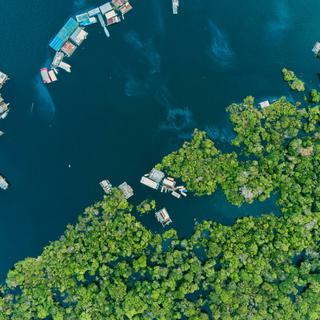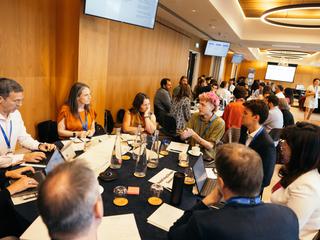From foundation to function
Launched in 2024 as the first of Climate Arc (Arc)’s localized coalitions, the Climate Finance Hub Brasil (Hub) was created to strengthen transition capacity where it matters most—within emerging and high-impact economies.
Formed through a consortium between Instituto Clima e Sociedade (iCS), the Federal University of Rio de Janeiro (UFRJ), Cooperaclima, and the Brazilian Foundation for Sustainable Development (FBDS)—and supported technically by Arc—the Hub brings together expertise from academia, philanthropy, and finance to unlock new levels of transparency in corporate transition data.
Turning local data into global insight
Over the past year, the Hub has produced sector-specific assessments of Brazilian companies’ transition readiness using globally recognized methodologies—such as the Accelerate Climate Transition (ACT) initiative, developed by the French Agency for Ecological Transition (ADEME) and CDP, and the Deep Decarbonization Pathways (DDP) developed by UFRJ—adapted to Brazil’s national context.
These efforts build on the methodological foundations and data ecosystem across the TransitionArc network, and are supported by partners including the World Benchmarking Alliance, Corporate Knights, InfluenceMap, and the Transition Pathway Initiative (TPI). Together, these collaborations ensure the Hub’s analysis is both credible locally and comparable globally.
Now, for the first time, this data is available on TransitionArc.
As of November 2025, the platform hosts detailed assessments of 30 of Brazil’s most prominent Electricity and O&G companies powered by the Hub's analysis—making the country’s corporate transition progress visible alongside global peers.
Building capacity for systemic impact
The Hub’s work extends beyond data generation. Through a structured training program for financial professionals and junior analysts, it is helping to embed transition literacy across Brazil’s financial sector—equipping participants to interpret transition data, assess risk, and guide investment toward a low-carbon economy.
This growing community is reshaping how transition risk and opportunity are understood, strengthening both market confidence and accountability.

A model taking root
The integration of Brazil’s transition data into TransitionArc demonstrates how local partnerships, data infrastructure, and analytical rigor can combine to deliver systemic impact.
This milestone reflects a collective effort made possible by methodological and data partnerships across the TransitionArc network, whose frameworks and collaboration continue to guide the Hub’s evolution.
Arc is proud to support the Hub’s technical foundations and to learn from this collaboration as we explore similar models in other regions.
From São Paulo to Singapore, Nairobi to New York, the path forward depends on enabling regions to generate, own, and connect their transition data—turning local insight into global progress.
Interested in collaborating on localized analysis?
We welcome partnerships with organizations building regional capacity and connecting local transition data to global systems.




